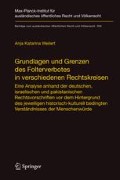The Germanic people rarely practiced torture. The reasons for this are lying in the decentralized structure of their tribes, the character of punishment as a private issue for individual parties, as well as the way that evidence was traditionally obtained: if evidence was needed, one referred to oath, ordeal or duel, which made torture unnecessary. In the Late Middle Ages, torture became used by the church to fight the heretics as well as during secular criminal proceedings to convict criminal offenders. The implementation of the inquisitorial principle in criminal proceedings and the focus on obtaining a confession of the accused resulted in a wider use of torture. Finally, torture became regulated by law, which at the same time restricted its application. Most notably, the Constitutio Criminalis Carolina (the first common German Criminal Code, dated 1532) cut back the arbitrariness which was accompanying the use of torture. However, it was not until the 18th century that the abolition of torture began and then quickly spread.
At the present time, torture is prohibited by the German Constitution according to Art. 104 para 1 sentence 2 Grundgesetz (GG) (“Misshandlungsverbot”), Art. 2 para 2 sentence 1 GG and above all by the protection of human dignity (Art. 1 para 1 GG). Although the German Constitution declares human dignity to be “unantastbar” (sacrosanct), some writers allege that torture is permissible if it is used to repel the infringement of the human dignity of a victim (“Würdekollision”). They argue that Art. 1 para 1 GG at the same time obligates the state to refrain from infringing human dignity as well, as it calls on the state to protect human dignity from being infringed by third persons. They allege that both duties, to not infringe and to protect human dignity, are equal. This view is rejected in this thesis and it is thoroughly put forward why the prohibition to infringe human dignity by acts of the state is stronger than the calling for protecting it from being violated through terrorists or delinquents.
On the sub-constitutional level there exists no authorization for the state officials to use torture in any situation. It is explained why there is no antagonism despite the fact that the German law allows its officials to kill e.g. a hostage-taker under certain premises. If a state official faces a “ticking-bomb” situation and he uses torture to prevent the catastrophe, he will be held accountable at a criminal court for his deed. It is alleged that torture can never be justified under German law. However, the person may be excused if the requirements of ∫ 35 para 1 Strafgesetzbuch (criminal code) or of the “übergesetzlicher entschuldigender Notstand” are fulfilled. This distinction is important, as a “justification” means that the deed is approved by the legal order, while the “exculpation” only takes into account the tragic situation in which the state official has been placed.
With this absolute prohibition of torture in national law, Germany complies with its international obligations, as the country is part of all important international treaties which prohibit torture.
Access this chapter
Tax calculation will be finalised at checkout
Purchases are for personal use only
Preview
Unable to display preview. Download preview PDF.
Editor information
Rights and permissions
Copyright information
© 2009 Max-Planck-Gesellschaft zur Förderung der Wissenschaften e.V., to be exercised by Max-Planck Institut für ausländisches öffentliches Recht und Völkerrecht, Heidelberg
About this chapter
Cite this chapter
(2009). Teil: Jüdisch-israelischer Rechtskreis. In: Weilert, A.K. (eds) Grundlagen und Grenzen des Folterverbotes in verschiedenen Rechtskreisen. Beiträge zum ausländischen öffentlichen Recht und Völkerrecht, vol 200. Springer, Berlin, Heidelberg. https://doi.org/10.1007/978-3-540-87748-6_3
Download citation
DOI: https://doi.org/10.1007/978-3-540-87748-6_3
Publisher Name: Springer, Berlin, Heidelberg
Print ISBN: 978-3-540-87747-9
Online ISBN: 978-3-540-87748-6
eBook Packages: Humanities, Social Science (German Language)

